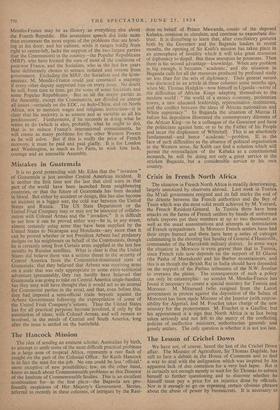Mistakes in Guatemala
It is no good pretending with Mr. Eden that the " invasion " of Guatemala is just another Central American incident. It is neither the first time nor the last that civil wars in that part of the world have been launched from neighbouring countries, or that the future of Guatemala has been decided in blood. But either by accident or design, this has also become an incident in a bigger war, the cold war between the United States and Russia. The US State Department or the United Fruit Company may or may not be innocent of collabo- ration with Colonel Armas and the " invaders." It is difficult to see how it can be proved either way—he is, in any event, almost certainly using arms that have been supplied by the United States to Nicaragua and Honduras—any more than it can be proved whether or not President Arbenz had predatory designs on his neighbours on behalf of the Communists, though he is certainly using Iron Curtain arms supplied in the last few months by Russian satellites. What is clear is that the United States did believe there was a serious threat to the security of Central America from the Communist-dominated state of Guatemala; that they believed that Arbenz was receiving arms on a scale that was only appropriate to some extra-territorial adventure (presumably, they can hardly have believed that Guatemala was going to take on Central America single-handed, but they may well have thought that it would act as an arsenal for Communist parties in the area), and that, even before this, they had imposed a semi-official trade boycott against the Arbenz Government following nA the expropriation of some of the United Fruit Company's estates. Thus the United States has for all practical purposes beconie involved, if only by the association of ideas, wish Colonel Armas, and will remain so involved, in the minds of Central and South America, long after the issue is settled on the battlefield.


































 Previous page
Previous page